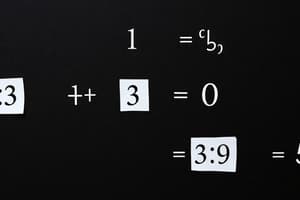Podcast
Questions and Answers
In the expression $4^2$, which part represents the exponent?
In the expression $4^2$, which part represents the exponent?
- $4$
- Neither $4$ nor $2$
- $2$ (correct)
- The operation symbol $^$
Following the PEMDAS rule, what should be solved first in the expression $3 + 4 * 2^2$?
Following the PEMDAS rule, what should be solved first in the expression $3 + 4 * 2^2$?
- $4 * 2^2$ (correct)
- $4$
- $2$
- $3$
What is the result of $2^3 * 6^2$?
What is the result of $2^3 * 6^2$?
- $36$
- $432$ (correct)
- $72$
- $144$
According to the order of operations, which operation should be done first in $5^2 - 3 * 2$?
According to the order of operations, which operation should be done first in $5^2 - 3 * 2$?
If given the expression $7^2 / 49$, what is the correct simplified form?
If given the expression $7^2 / 49$, what is the correct simplified form?
In the calculation $6 * 3^2 / 2$, which operation should be conducted first according to the order of operations?
In the calculation $6 * 3^2 / 2$, which operation should be conducted first according to the order of operations?
In the expression $5 \times 4 + 3$, which operation is performed first?
In the expression $5 \times 4 + 3$, which operation is performed first?
What is the result of the expression $9 \div 3 - 2$?
What is the result of the expression $9 \div 3 - 2$?
Which operation has higher precedence in the expression $2^3 \times 6^2$?
Which operation has higher precedence in the expression $2^3 \times 6^2$?
In the expression $4^2 \div 49$, which part represents the exponent?
In the expression $4^2 \div 49$, which part represents the exponent?
Which operation should be conducted first in the calculation $6 \times 3^2 \div 2$?
Which operation should be conducted first in the calculation $6 \times 3^2 \div 2$?
In the expression $5^2 - 3 \times 2$, which operation should be done first?
In the expression $5^2 - 3 \times 2$, which operation should be done first?
What is the result of the expression $3 * (4 + 2)$?
What is the result of the expression $3 * (4 + 2)$?
In the expression $(8 - 2) \div 3$, what is the final result?
In the expression $(8 - 2) \div 3$, what is the final result?
Evaluate the expression: $5 + 3 * (2 + 1)$
Evaluate the expression: $5 + 3 * (2 + 1)$
What is the result of $(10 \div 2) + 3 * 2$?
What is the result of $(10 \div 2) + 3 * 2$?
Simplify the expression: $(6 * 2) + (4 \div 2)$
Simplify the expression: $(6 * 2) + (4 \div 2)$
Flashcards are hidden until you start studying
Study Notes
Order of Operations and Exponents
The order of operations, often referred to as PEMDAS (or BODMAS outside the US), is a set of rules designed to ensure consistency when solving mathematical expressions. It provides a universal guideline for following a specific sequence of steps to resolve complex calculations accurately. One of the main components of this order is the handling of exponents.
Exponents in Mathematics
An exponent is represented by a small superscript number, which indicates the power to which the base number is raised. For example, in the expression 2^3, the base number is 2, and the exponent is 3, meaning 2 is raised to the power of 3.
Exponents and the Order of Operations
Exponents play a crucial role in the order of operations because they involve multiplying or dividing the value of a given number repeatedly. According to the PEMDAS rule, after parentheses, you must address any exponents before proceeding with other operations. This ensures that you don't accidentally overwrite the result obtained through exponentiation.
Let's consider an example:
5 * 3^2
According to the PEMDAS rule, we must handle the exponent before the multiplication:
5 * 3^2 -> 5 * 9
So, the correct calculation would be:
5 * 9 = 45
If we had followed a different order, we might get a different answer, highlighting why the order of operations is so important.
Studying That Suits You
Use AI to generate personalized quizzes and flashcards to suit your learning preferences.




